
Jen Blatz, principal UX researcher at Boeing Employees' Credit Union (BECU), takes us on a journey from journalism to UX design, sharing practical insights from the trenches of financial institutions and animal hospitals. With experience spanning VCA animal hospitals to Capital One to Rocket Mortgage, Jen brings a refreshingly honest perspective on the evolving UX landscape—including what's broken with personas and why the future might look different than we think.
Her background in journalism shapes how she approaches ethnographic observation, whether she's watching veterinarians work with anxious pets or understanding how credit union members navigate digital banking. Jen doesn't shy away from tough conversations about AI's role in research, the limitations of traditional UX methods, or the reality of today's competitive job market.
Currently at BECU, Jen navigates the unique challenge of conducting remote research for a Washington State credit union while being based in Texas herself, highlighting how smaller financial institutions operate differently from big banks with vendor constraints and community-focused approach.
Key points:
Jen also touches on the challenges of remote research when you're not physically located where your users are, and how the pandemic shifted both researcher capabilities and user expectations around digital experiences.
The audio and video for this episode has been edited by Gideon Kroutil.
Special Guest: Jen Blatz.
Links:
Dr. Chui Chui Tan, cultural strategist and author, shares her journey helping businesses navigate cultural nuances for global growth. With over 16 years of experience in user experience internationally, she has orchestrated successful market launches for companies like Spotify, Netflix, and Bumble across 50 countries. Her approach goes beyond user research and experience to incorporate a holistic understanding of market ecosystems, helping businesses avoid cultural stereotyping while making informed strategic decisions.
Born in Malaysia to Chinese parents, Chui Chui moved to the UK over 20 years ago. Her unique background and global experience inform her approach to cultural strategy. Beginning with mechanical engineering and an unexpected transition through music technology to human-computer interaction, she eventually specialized in international research after conducting user interviews in Beijing for a hotel client.
Over time, her work evolved from pure user experience research to a more holistic approach that considers history, infrastructure, politics, and economic factors when helping businesses enter new markets.
Key points from the conversation:
Chui Chui also shares her fascination with understanding the origins of cultural differences, currently exploring this through reading "Sapiens" by Yuval Noah Harari among others.
You can find Chui Chui at:
The audio and video for this episode has been edited by Gideon Kroutil.
Special Guest: Dr. Chui Chui Tan.
Links:
Drew Burdick, founder and managing partner of StealthX, shares his unconventional journey into design and entrepreneurship. After growing up in the Philippines (age 4-18) and studying political science and communications in college, a chance internship introduced him to graphic design — beginning with a bootleg copy of Illustrator/Photoshop CS2. During the 2009 recession, Drew scrapped his way forward, balancing freelance design work with jobs like valet parking at the Ritz Carlton and window washing.
His path included founding a successful clothing brand for the electronic music scene (complete with 163 street team members) before transitioning into corporate roles and eventually launching StealthX, a consultancy focused on customer strategy, product design, and software engineering.
Key points from the conversation:
Drew also predicts that within a year, solopreneurs will increasingly build and launch products independently using AI tools, potentially challenging traditional team structures in larger organizations. He encourages experimenting with these tools, seeing them as opportunities to augment human creativity rather than as threats.
Listen to the second part of our conversation over at Drew's podcast, "Building Great Experiences" —
• On Apple Podcasts: https://podcasts.apple.com/za/podcast/future-of-cx-beyond-product-into-ecosystems/id1776618976?i=1000686740180
• On Spotify: https://open.spotify.com/episode/329mlkTWefrP7nQr8KMRV5?si=doVa-TrxS52MyNIjGHDDCA
• Or watch it on YouTube: https://youtu.be/RShAkpaXRwU?si=KX9sgbXRQDABmL_Z
Special Guest: Drew Burdick.
Links:
Skipper chats with Bumhan Yu, a designer and coder, about his perspective shaped by his linguistics and psychology background. After moving from Korea to New York City, he transitioned from academia to design, where his non-design background enriches his approach to understanding user needs and communication. His career evolved from graphic design to design operations and team dynamics, emphasizing problem understanding before solution creation. Beyond design, Bumhan maintains interests in theoretical physics and the Zettelkasten note-taking method among other topics.
During the show, we talk through a number of topics, including:
Here's a photo of Bumhan's t-shirt from the episode:
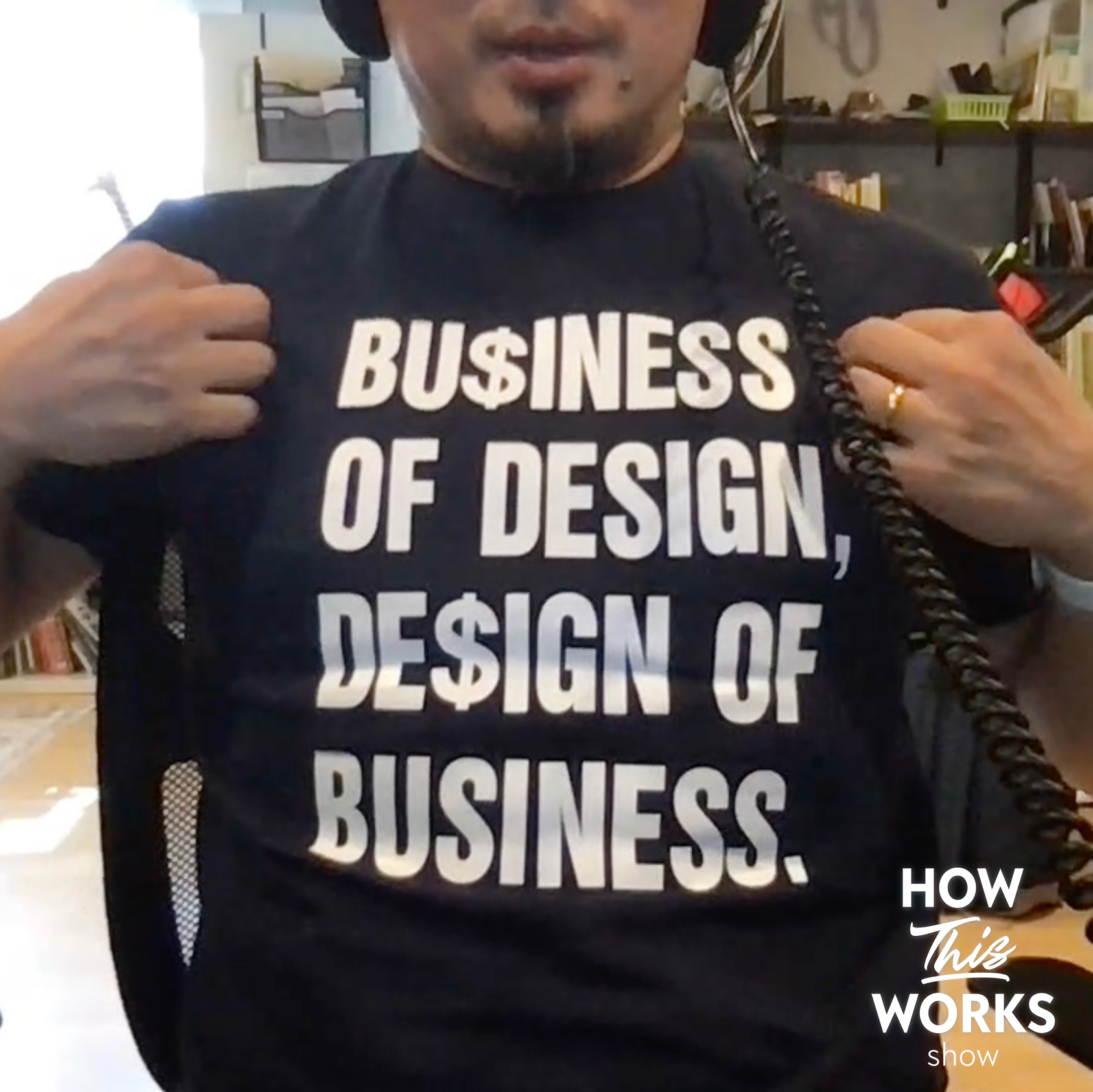
Special Guest: Bumhan Yu.
Links:
Skipper chats with Aaron Young, founder of Switch Insights, breaking down the concept of "switch interviews" — a lesser known methodology that reveals the contextual moments leading customers to change products or services, emphasizing the importance of understanding the "why" behind customer behavior rather than just the "what." He explains that while companies often think they know why customers switch, a directed interview can reveal the complex, messy reality of customer decision-making, encompassing factors like grievances, magnetism, and effort underneath and surrounding the change.
During the show, we talk through:
Stay tuned until the end where Skipper tells Aaron about Stephen Colbert's oatmeal rum-soaked bing cherry cookie recipe, which Colbert (yes, him) says is so irresistible you'd "step on a baby's finger for one."
Special Guest: Aaron Young.
Links:
In this episode, Andy Polaine, Dr. Polaine to some, talks about his career journey, starting with his background in film and interactive media, his transition into service design, and his current focus as a design leadership coach. Andy discusses his coaching approach, which is rooted in his experience as a designer, facilitator, and teacher. He also talks about some of what he's hearing from design leaders right now, emphasizing the importance of reading the room, even in a digital context, and how his work addresses common challenges faced by design leaders, such as imposter syndrome and the "leadership dip" — a period of uncertainty and self-doubt that can arise when transitioning into a leadership role. The interview also touches on the evolving role of design leadership in organizations and how designers can more effectively communicate the value of their work to stakeholders.
Some topics discussed:
Stay tuned until the end where we hear a behind the scenes (bts) snippet, a peek into our lives today, where we wait for Andy's wife to open/close some doors as she's seeing a patient at home while we're recording.
Special Guest: Andy Polaine.
Links:
Joanne Weaver, who co-runs a design recruiting agency in New York City, discussed her dual career in recruitment and music. She highlighted the importance of networking and tailoring job applications to specific roles. Joanne emphasized the need for efficiency in communication and the value of understanding both job seekers and clients. She shared her journey from starting her agency during a financial crisis to having built a successful business. Joanne also discussed the significance of connection and authenticity, both in her professional and personal life, recommended the show "Alone" for its exploration of human resilience, and talked about her semimonthly show on LinkedIn live with two other design recruiters, Jared Tredly and Erica Fortgang for Design:Unfiltered @DesignedXTalent
Keep listening until after the outro music for a bit of tape from our first attempt at recording (Internet connection problems) where Joanne talks about how being a singer and being a performer helps to understand the clients and job seekers she works with.
A few specific points from the episode:
Special Guest: Joanne Weaver.
Links:
On this episode of the How This Works show, Skipper Chong Warson talks to Carl Cleanthes, founder of Epic Made, a creative content agency based in Hampton Roads, Virginia. Carl shares his entrepreneurial journey from selling timeshares to establishing an agency that now collaborates with top brands like SyFy, Nickelodeon, USA, TNT, and WWE. He discusses his passion for art and creativity, focusing on his exploration of NFTs as a way to immortalize his late father’s artwork. Throughout the conversation, Carl emphasizes the importance of living authentically, expressing emotions freely, and using his creativity to honor his father’s legacy.
Listen above or wherever you get your podcasts: https://www.howthisworks.show/028-carl-cleanthes. You can also listen on Youtube: https://youtu.be/yn74GSse5f0.
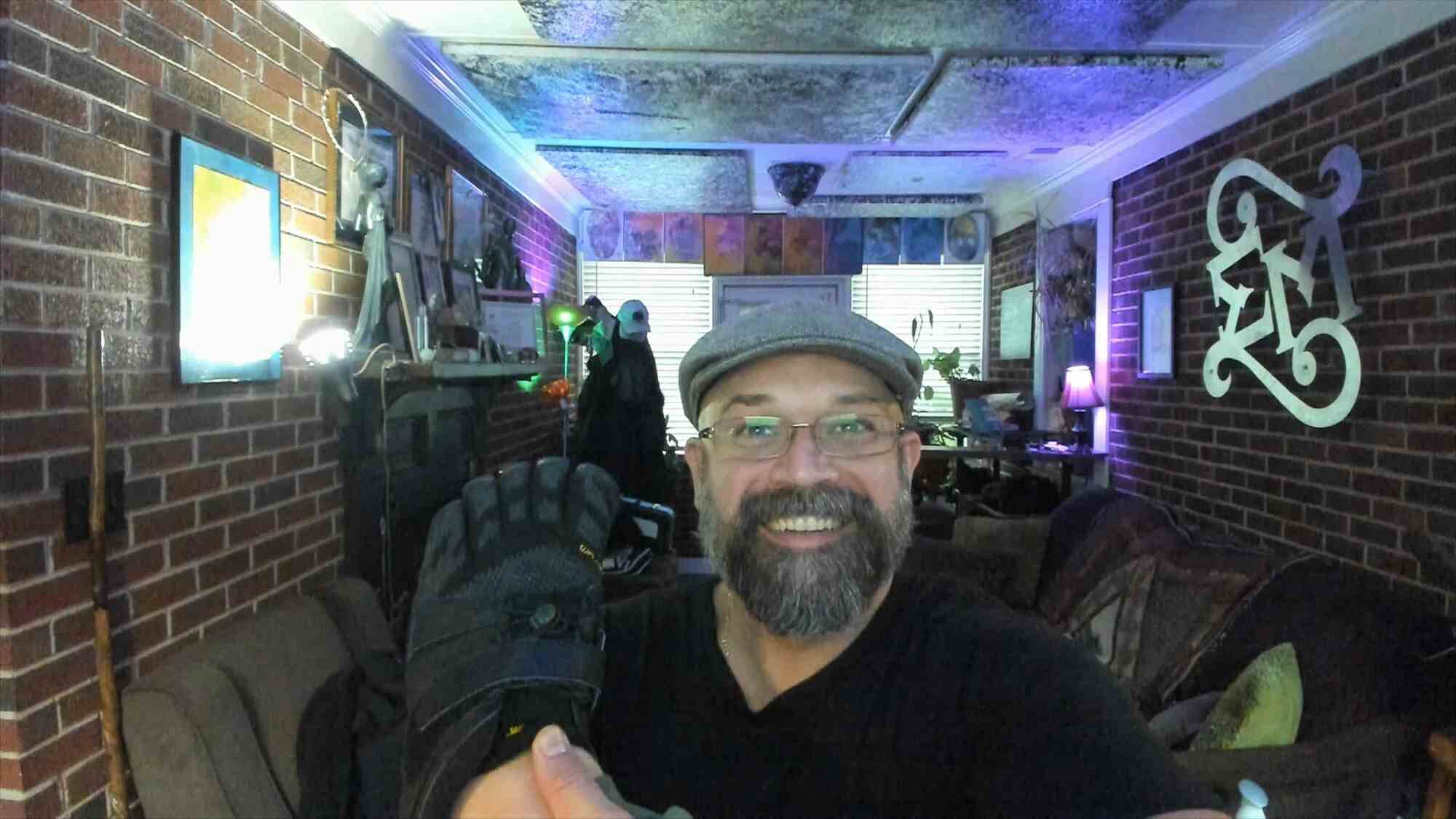
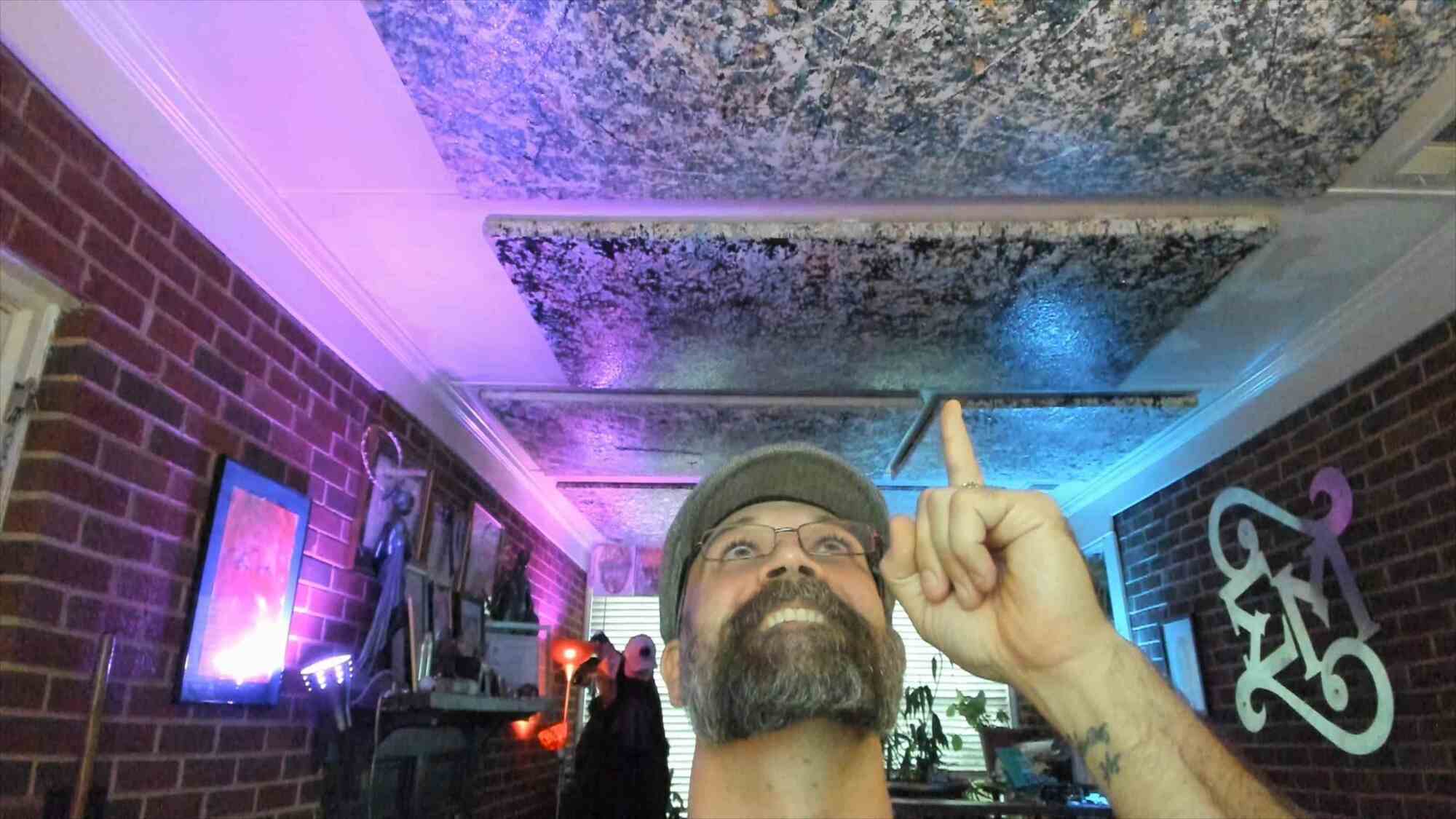
Key details from the episode:
Special Guest: Carl Cleanthes.
Links:
Back in August, Skipper had a conversation with Jen Dary about her personal experiences and insights on leadership coaching, the importance of self-awareness and belief in one's abilities, Plucky's So Now You're a Manager (SNYaM), navigating the publishing industry, and prioritizing self-care in the coaching profession. Other topics include:
Special Guest: Jen Dary.
Links:
Stay tuned for a bit of tape at the end where Karen and Skipper talk about one's "need to be right."
Note from TED: Karen's talk linked below contains a discussion of suicidal ideation. If you are struggling with suicidal thoughts, please consult a mental health professional and/or support organization, as this talk is not a substitute for mental health advice. If you are struggling with self-destructive or suicidal thoughts, call or text 988 to connect with someone who can help.
Special Guest: Karen Faith.
Links:
Zolt Levay is a photographer who has produced astronomical images from the Hubble Space Telescope and has spent a career describing the process of producing engaging color images from Hubble data. Now, he has his sights set on matters closer to home, working on more terrestial matters.
During this conversation, Skipper and Zolt talk about how images are produced from the Hubble Space Telescope, the importance of being curious, how professional telescopes don't "see" in color, the size of 24 million soda straws, Ansel Adams, the notion of time travel, and his more recent hobby of astrophotography.
Stay tuned until the end for a clip on how to pronounce Zolt's first and last name the Hungarian way.
Special Guest: Zolt Levay.
Links:
The last time we talked with Dr. Peter Chin-Hong, it was Dec 2020. Now, it's May 2022 — 17 months later. A lot has changed and in some ways it feels like nothing has changed. This time around, we get into current details around coronavirus/COVID, what's happening now/the current state, and what the future looks like.
We recorded this episode over two sessions and along the way we get into many topics, including the notion of reinfections (more and more common with Omicron), how the testing numbers may not reflect actual cases with more and more home testing (and some people not testing at all), how an at-home test is different than a PCR test, and the current slate of variants — BA.1, BA.2, BA2.12.1, BA.4, BA.5, XE, etc. We also touch on COVID therapies including Paxlovid, an oral antiviral treatment, and Evusheld, monoclonal antibodies. As well, we talked about some of what Dr. Chin-Hong is concerned about in the future — including avian flu and influenza along with the idea that diseases like valley fever (coccidioidomycosis) have been creeping up over the last few years because we as humans are settling into areas (more rural, for instance) that large groups of us haven't been before. And then, we end the show by talking about his work as a professor of medicine and educator at University of California, San Francisco (UCSF) — what teaching medicine has looked like the last few years with students (and teachers) as little blobs on a screen.
Stay tuned until the end of the episode for a longer bit about the flu that didn't really have a place anywhere else.
Special Guest: Dr. Peter Chin-Hong.
Links:
Recorded in their child's bedroom on a weekday, Laura and Skipper chat about his academic background in writing (English literature, playwriting) as well as his professional background as a product design director (think desktop and mobile apps among other mediums) and how that plays into storytelling, most recently resulting in the creation of How This Works, this podcast.
They also talk about their life together — newsflash: they're married and living in the San Francisco Bay area, having moved from New York City a couple of years ago. Along the way, they get into some of the differences between life in SF and NYC. They also talk about their upcoming wedding anniversary after getting married next to Jane's Carousel in Brooklyn Bridge Park.
Along with talk about his name change from Starr to Skipper (and not Optimus Prime) at the age of seven, they bring in a few questions posed from the listening audience including lessons learned from the first season of the show, calling people the name they want to be called, how crucial listening is in making a podcast, the ubiquity of imposter syndrome, using the five (5) whys to get to the root cause of a challenge as developed by Sakichi Toyoda at the Toyota Motor Corporation, team falling asleep during movies versus team staying awake during movies, and why Skipper color codes versus alphabetizing the books in his background — see photo below.
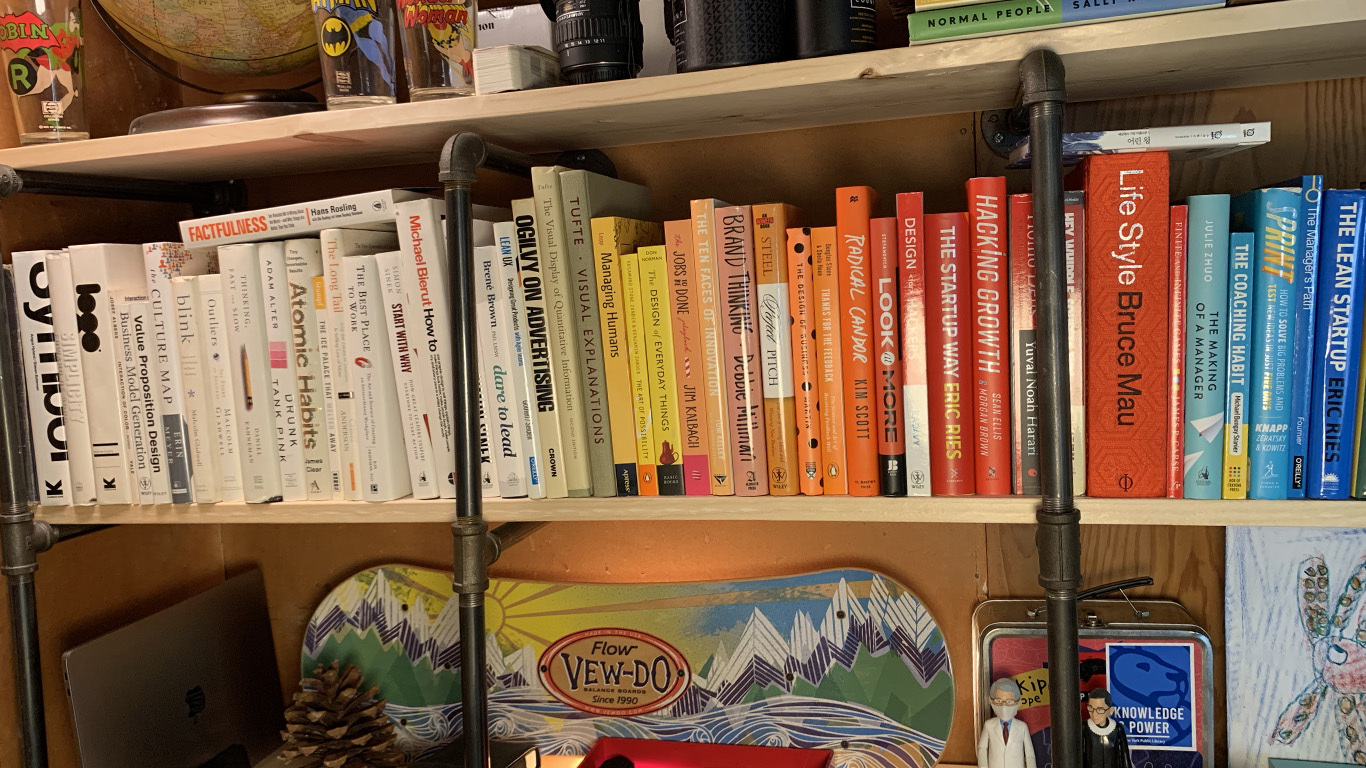
View of the three shelves behind Skipper's standing desk
Laura and Skipper also reference the following previous episodes, in order of being published, including:
Stay tuned after the outro music for a bit of tape where Skipper pauses for a bit of background noise and how from where Laura's sitting, the microphone makes it looks like his nose is a black bit of foam.
Special Guest: Skipper Chong Warson.
Links:
Tomorrow, we're recording the last episode of the first season where we turn the tables and Skipper's wife Laura asks him the questions. Go to Instagram @howthisworksshow to reply directly to the story or email us at howthisworksshow@gmail.com.
Thanks so much!
Skipper talks to Sarah Sudhoff about how she works as an artist, her background as a photographer, arts administrator, and photo editor — and how all of that plays into her work today.
Recorded late on a Sunday night, Skipper and Sarah talk about her identity as being half Cuban, how she got her first camera in the fifth grade, how being in a military family influenced her world and personality at a young age, being both the science nerd and the jock, and how she studied astronomy in college before she decided to pursue photography as her bachelor's degree — though she'd really like to work with NASA still. Following that, she worked for Citysearch before landing at Time magazine and received a M.F.A. in Photography from Parsons School of Design in New York.
We get into how she wears many hats as an artist, how she multi-tasks as a single parent in her home life, how she collaborates in her work with others, and the necessary resilience of applying for as well as receiving/being rejected for exhibitions, grants, endowments, and fellowships. She and Skipper also talk about the notion of making daunting life decisions at 19 versus 29 or 39. We also talk about several of her works in particular: Point of Origin, her most recent El Recuerdo project which started as a response to Deborah Brown’s paintings but then evolved to be a tribute to her grandmother and Sarah's biracial heritage, The Reading Brain, 60 Pounds of Pressure, Will You Hug me Forever, and her upcoming work Labor Pains.
Video from El Recuerdo: Rope by Sarah Sudhoff
Video from El Recuerdo: Water by Sarah Sudhoff
Sarah says that she's finally feeling worthy to apply for a Guggenheim and MoMA this year — to which we say, Break a leg!
When pressed, she talks about how art is hard and her advice for her two children if they wanted to go into some kind of artistic profession.
Stay tuned for a bit after the outro music where after Skipper rambles on for a bit and Sarah asks simply, What's the question?
Special Guest: Sarah Sudhoff.
Links:
This week, Skipper chats with Piper Payne, an audio mastering engineer.
Currently based in Nashville, Tennessee, Piper starts off the episode with her professional introduction and then tells us "who she actually" is, including her being originally a Midwesterner, having three dogs, being an Aries, and her love of cheeseburgers.
We talk about how if she wasn't a mastering engineer, she might be in some form of construction or maybe a carpenter. We get into how she's a drummer, starting when she was a "shrimpy kid", her technical music studies at the University of Michigan and then her graduate work in Norway, and working under Bob Katz and Michael Romanowski. Then, Piper dives into how she calibrates her mastering console with sine tones and noise, how music is mastered from a high level, her growing up on young country, her love of top 40 pop music, how vinyl records are made (think waffles), how musicians get paid (in the past and more recently), and the potential of non-fungible tokens to help artists get paid for their work as well as keep better track and make decisions about their efforts to tour, promote, and construct release plans.
We also talk about some of the assumptions that people have about being a mastering engineer, how it's not alchemy.
Below is a snapshot of the record shelves Piper mentions on the show as something she built recently that she's proud of:
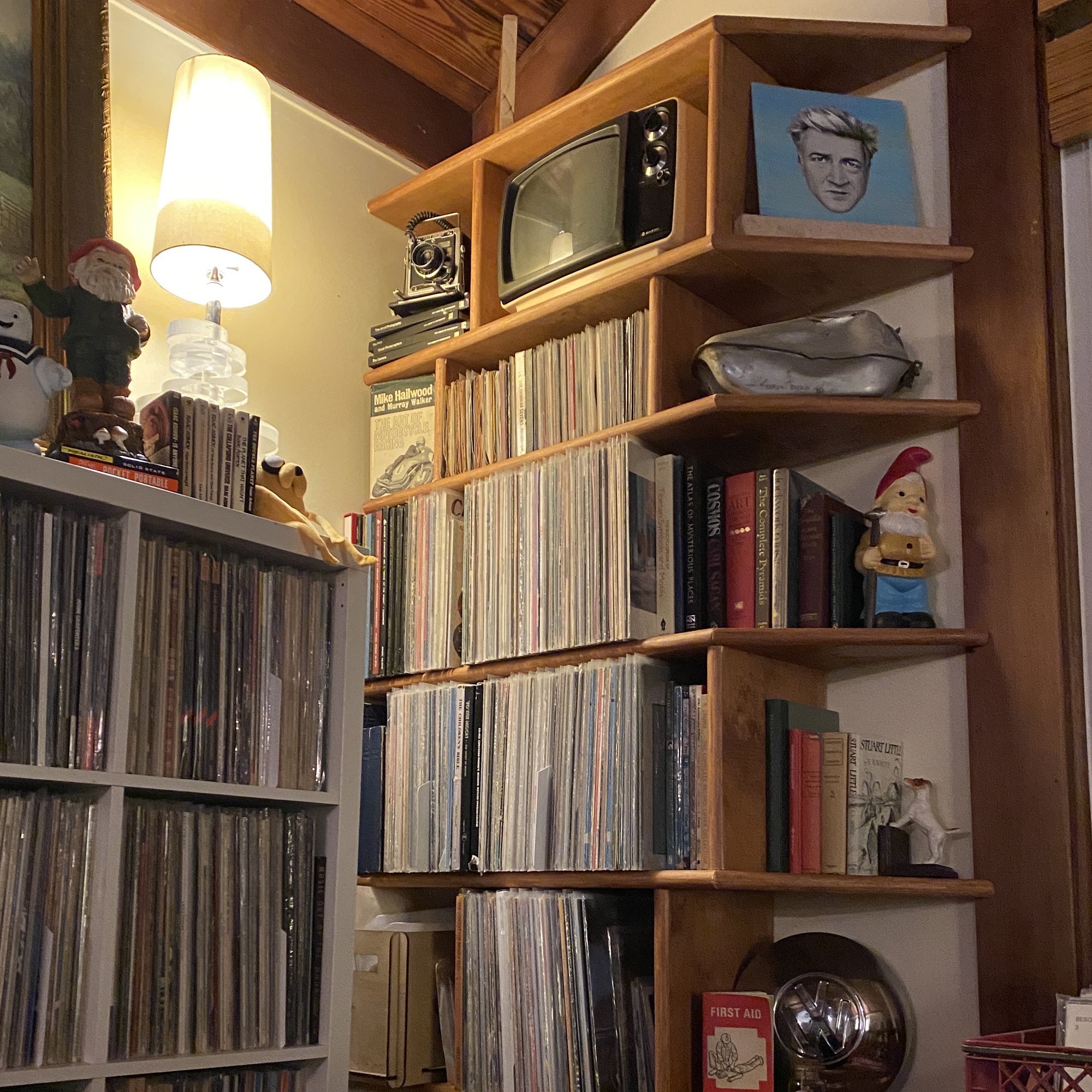
Stay tuned after the outro music to hear Skipper work out the right way to introduce Piper as an audio mastering engineer or a mastering engineer.
Special Guest: Piper Payne.
Links:
This episode of How This Works addresses adult subject matters and contains adult language.
This week, Skipper chats with Kait Scalisi, a certified sex educator who founded Passion by Kait. They engage in a wide-ranging conversation that explores so many areas — including shame, communication, and how pleasure is really powerful as a healing force.
And there's so much under the surface as well, like how some people carry their disabilities in plain sight, the concept of accessible design, how she started doing this work, how with sex there's no such thing as "normal", a lightweight formula around how to talk about sex with your partner, her delight in the concept of verbal consent is showing up in romance novels, consent culture and the underlying sentiment to act first, apologize later, #notallmen, Resmaa Menakem on the notion of somatic abolitionism, and assumptions that Kait has had to work against as a sex educator.
Stay tuned after the outro music for a pause for sirens in Kait's New York City sound background, an ever present aural reminder of the big city. Skipper misses it.
Special Guest: Kait Scalisi.
Links:
This week, Skipper chats with Sally McRae, a pro runner for Nike and NordicTrack among others.
Based in Bend, Oregon, Sally starts off by talking about how she often gets mistaken for a bodybuilder, a cross fitter, and even a cage fighter. She also gets into many more details of her life, including growing up in a family of seven, playing soccer and starting to run because "she knew she had the speed" and then as a way to stay in shape and cross-train, running her first marathon, discovering ultrarunning, running Western States 100 in 2014 (as captured in the short film "Western Time" — linked below), the importance of crew in ultrarunning, and what she thinks is at the heart of the sentiment, "I'm not a runner, or I wasn't made for running, or running is stupid".
We also talk about some of the assumptions that people have about being a pro runner, the power of the community around running and ultrarunning, how running long distances with people can get past the polite and light social conversations, dispelling the common thinking that Skipper's name came from Gilligan's Island, why running is painful, needing to take care of yourself first and foremost, how on a 100 mile race that you will stir up something deep, and how some of the events locally and in the world might mirror some darker moments in our lives.
Stay tuned after the outro music to hear Sally's joy about relocating to the mountains with her family.
Special Guest: Sally McRae.
Links:
Today's episode features a conversation with two sisters — Kat Hantas and Nicole Emanuel — about 21Seeds, their company that makes all-natural, infused tequila.
They talk about what they did before starting the company — film work and corporate finance, respectively — when Kat's doctor instructed her to stop drinking fermented spirits like wine, beer, and sake to drink distilled spirits like blanco tequila instead.
And after eight years of infusing tequila in her kitchen, Kat enlisted her sister Nicole and their friend, Sarika Singh, to start 21Seeds — the name comes from two friends + one girlfriend with things that are all-natural, that grow from a seed — with a distillery in the town of Tequila in Jalisco, Mexico run and staffed by women whose hours coincide with school schedules, so the moms don’t have to pay for childcare. The sisters talk about the three tiers set up by the tied-house rule, why they didn't name the company Casamigas (a play on Casamigos), chill filtration (and how it removes aldehydes), keeping the heart but leaving out the head and tail when distilling alcohol, how you can go blind from moonshine (depending on the how and who's making it), and the differences between flavored and infused liquor.
This is an especially fun episode as both sisters keep it light while the conversation moves easily. Nicole and Kat debate which Constitutional amendment made alcohol illegal and which one repealed Prohibition, the dangers of home infusing tequila in a Brita, and how Oprah Winfrey — as a tequila fan and someone who infuses tequila herself — paid the product a high compliment in assuming it was freshly infused.
Stay tuned after the outro music to hear Skipper trip all over over the pronunciation of Kat's last name. So you all know, Hantas is pronounced like Pocahontas or haunting.
Special Guest: Kat Hantas and Nicole Emanuel.
Links:
This week, Skipper chats with Laura Sicola, a leadership communication and influence expert, speaker, author of "Speaking to Influence: Mastering Your Leadership Voice" (bookshop link), a coach, and host of the podcast, "Speaking to Influence: Communication Secrets of the C-Suite". But this conversation isn't just for managers or people in the C-suite, it's for anyone who wants to hear yes a bit more in their lives. As Laura says, this subject matter is every bit as "relevant with your coworkers, boss, employee, colleague, client, vendor, or otherwise, as it is with people in your personal life. And it is — whether it's with your spouse, significant other, your children, your neighbors, your friends, and co parishioners at church, temple, mosque, wherever you go, or religious house".
We talk about so many things, including her work sitting at the intersection of how language works — or what Laura refers to as the math of language — cognitive processing and language, and social filters; how non-native languages to young kids can feel like a superpower, how some people listen like others wait for the right moment to jump into a double dutch jump rope session, bosses versus leaders, manipulation versus influence, myth-busting one of the most misquoted statistic in communications research, how we all have a prismatic voice, and how authenticity is absolutely essential in how we use our voice.
Stay tuned after the outro music for a quick levels check, a peek behind the scenes.
Special Guest: Laura Sicola.
Links: